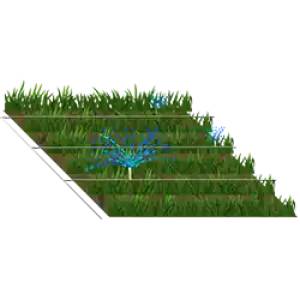Description
Biofilter Process: A Natural Solution for Wastewater Treatment
Harness the Power of Nature for Efficient and Sustainable Wastewater Purification
The Biofilter Process leverages the natural metabolic processes of microorganisms to effectively treat wastewater, offering a sustainable and cost-effective alternative to traditional methods. This advanced biological treatment system utilizes a bed of media colonized by a diverse community of bacteria, fungi, and other microorganisms. These microorganisms break down organic pollutants, significantly reducing the biological oxygen demand (BOD), chemical oxygen demand (COD), and suspended solids (SS) in wastewater.
How it Works:
The process involves several key steps:
- Wastewater Introduction: Wastewater is evenly distributed over the surface of the biofilter media. The media provides a large surface area for microbial attachment and colonization.
- Microbial Metabolism: As wastewater percolates through the media, the microorganisms consume organic pollutants as a food source. This metabolic process converts organic matter into carbon dioxide, water, and biomass.
- Nutrient Uptake: The microorganisms require nutrients for growth and metabolism. The wastewater itself provides a source of essential nutrients, including nitrogen and phosphorus.
- Oxygenation: Adequate oxygen supply is crucial for aerobic microbial activity. This is achieved through various methods, including forced aeration or natural aeration depending on the biofilter design.
- Effluent Discharge: Cleaned wastewater, significantly reduced in pollutants, exits the biofilter system.
Key Advantages of the Biofilter Process:
- High Efficiency: Effectively removes a wide range of organic pollutants, resulting in high-quality effluent.
- Low Energy Consumption: Compared to activated sludge systems, biofilters generally require less energy for operation.
- Compact Design: Biofilters can be designed to fit various spaces, minimizing land requirements.
- Reduced Sludge Production: Produces significantly less sludge than activated sludge systems, reducing disposal costs and environmental impact.
- Robustness and Stability: Relatively resistant to shock loads and variations in influent characteristics.
- Environmental Friendliness: A natural and sustainable treatment method that minimizes chemical usage and reduces the carbon footprint.
- Cost-Effective: Lower operating costs compared to other advanced wastewater treatment technologies.
Applications:
The Biofilter process is suitable for a variety of applications, including:
- Municipal wastewater treatment: Treating wastewater from residential and commercial areas.
- Industrial wastewater treatment: Treating wastewater from various industries, such as food processing, breweries, and agricultural operations.
- Pretreatment of wastewater: Reducing pollutant load before discharging into a receiving water body or further treatment.
Media Selection:
The choice of media significantly impacts the biofilter's performance. Common media types include:
- Plastic media: Offers high surface area and good porosity.
- Natural media: Such as wood chips or lava rock, providing a more sustainable option.
- Composite media: Combining the benefits of different materials.
Customization and Design:
Biofilter systems are highly customizable, allowing for tailored designs to meet specific wastewater treatment needs and site constraints. Factors considered during design include influent characteristics, desired effluent quality, available space, and budget.
Conclusion:
The Biofilter Process presents a viable and environmentally sound solution for wastewater treatment. Its efficiency, sustainability, and cost-effectiveness make it an attractive option for a wide range of applications. Contact us today to learn more about how a biofilter system can meet your wastewater treatment needs.
